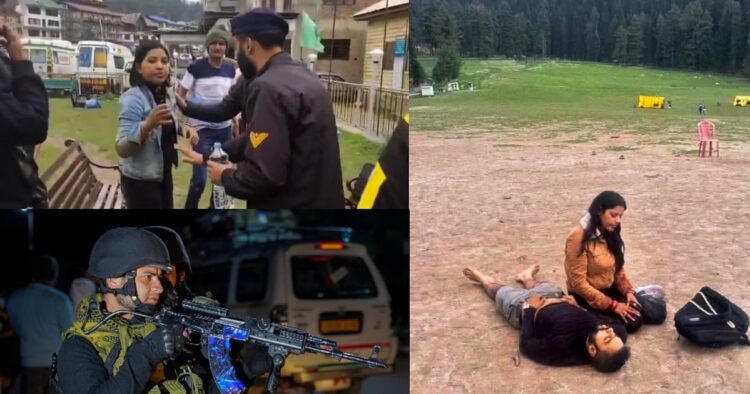“Recite the Kalima,” the gunman ordered. “When my husband couldn’t, they shot him in the head,” the woman said, her voice breaking as she relived the moment. “Then they looked at me and my son. We begged them to kill us too. But the terrorist said, ‘I won’t kill you. Go and tell Modi.’”
Just moments ago, the family, on a vacation to Kashmir, was strolling through Baisaran meadows near Pahalgam. The skies were clear, children laughed in the distance, and the pine trees swayed gently in the mountain breeze. Tourists ran for their lives, some falling, others dragging the wounded, and in just mere seconds, the scenic and peaceful Kashmir valley wept.
On Tuesday afternoon, one of the most brutal terror attacks in recent memory struck the heart of Kashmir on Tuesday, shattering what was supposed to be a peaceful holiday for dozens of tourists. At least 28 lives were lost, including two foreigners, as terrorists unleashed horror. The Resistance Front (TRF), a proxy of Lashkar-e-Taiba, has claimed responsibility for the carnage.
Eyewitness accounts suggest that the attack was chillingly methodical and religiously targeted. Survivors allege that the assailants, disguised in uniforms resembling police or army gear, asked tourists to reveal their religion. In several cases, they demanded that male victims recite the Kalima — a declaration of Islamic faith — and executed those who failed. Among the victims was Lieutenant Vinay Narwal of the Indian Navy — newly married, on leave. His life, like those of the others, was snatched away by hatred.
Shockingly enough, the attack came mere days after a venomous statement by Pakistan’s Army Chief, General Asim Munir, pushed divisive rhetoric, vilifying Hindus and reviving the Two-Nation Theory — a scar of Partition. “We are two nations, we are not one,” Munir declared, attempting to justify communal hatred under the guise of national identity. It was a calculated provocation, indicating that this was the sinister green light for the Tuesday terror attack that struck the heart of India and left the valley weeping.
Not only this, Tuesday’s massacre also strangely coincided with the visit of U.S. Vice President JD Vance. While on a personal trip with his family, Vance’s presence gave international attention to the attack, a tactic terrorists have used before. From Clinton’s 2000 visit to Trump’s 2020 trip during the Delhi riots, terrorists have a dark history of orchestrating violence against India during high-profile diplomatic moments, to—one, to gain global attention, and second, to vilify India’s image in front of international dignitaries. Vance condemned the attack unequivocally. So did former U.S. President Donald Trump, who stated that America stands with India against terrorism.
But words, however strong, can’t undo what happened in Pahalgam. Families have been destroyed. A fragile peace has been shattered. And once again, the Valley weeps — not just for the lives lost, but for the communal hate that continues to fester just across the border.
This was not just an act of terror. It was a deliberate strike against humanity, unity, and the spirit of India. And it must be condemned — by every voice that believes in peace, and should be met with a sharp, equal, and befitting response.

















Comments